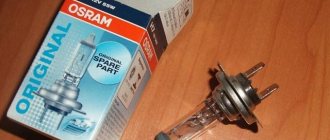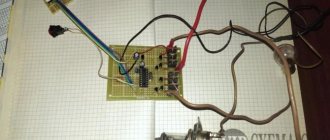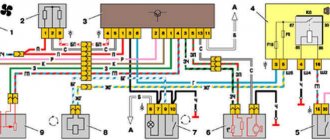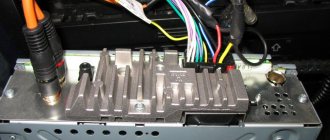Many car enthusiasts would like to replace the standard incandescent light bulbs in their cars with LEDs . The advantage of the latter is undoubtedly - low current consumption, durability, higher light output, no heating. It's nice to leave the headlights on and discover in the morning that the battery had no intention of being discharged. This article will help you replace car light bulbs with LEDs yourself and avoid common mistakes.
The main points that we need to learn:
1. Voltage in the vehicle’s on-board network . Typically this is 12 - 13 V when the engine is off and 13 - 14.5 V when the engine is running.
2. The supply voltage of a typical LED is 3.5 V. Depending on the color, this can be: for yellow and red LEDs - 2 - 2.5 V; for blue, green, white - 3-3.8 in. The typical current of a low-power LED is 20 mA, and a high-power LED is 350 mA. 3. Not all LEDs , unlike light bulbs , illuminate the space around them. This must be taken into account when replacing indicator lamps , for example, in the dashboard . When purchasing, you should pay attention to the type of lens or, if possible, ask the seller. Narrow-beam LEDs have a small lens at the end. In general, try to check this when purchasing, and
better yet, buy and try a few different ones.
4. An LED , like a battery , has a plus and a minus . The minus is called the cathode, the plus is the anode; in the diagrams they are depicted like this:
It should be clear to you that you can just pick it up and turn it on
LED into the car's on-board network - this means it is guaranteed to burn out.
Connecting LEDs
LED sockets, so-called clusters are sold on sale ; they are designed for 12V . You can simply connect them to the on-board network and enjoy the beautiful lights. But there is an unpleasant feature - when the engine speed changes, the brightness of the LEDs in the clusters . Slightly, but noticeable to the eye. In addition, in fact, they normally shine at a voltage of about 12.5V, so if you have low voltage in the on-board network, the clusters will glow dimly. Structurally, the cluster consists of a chain of LEDs and a resistor . For every three LEDs there is a resistor that suppresses excess voltage. The LED strip is designed in exactly the same way, so if you need to cut a piece, look at the strip, there are places on it where you can cut it. Usually these are the same three LEDs and a resistor. You can’t cut anywhere











